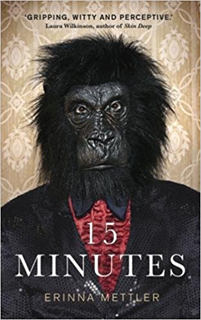
('Olivetti 1' © Andrew Pratt, 2003)
WHEN WILL I BE FAMOUS?
by TRACY FELLS
When will I be famous?’ sang Bros back in the eighties. It could be the title song to accompany Erinna Mettler’s short story collection 15 Minutes as fame and the cult of the celebrity link the twenty-two stories together. You’ll probably recognise that the collection’s title comes from Andy Warhol’s quote: ‘In the future, everyone will be world famous for fifteen minutes’. On the back cover of 15 Minutes a question is posed: ‘In a world obsessed with celebrity culture, do the best stories belong to ordinary people?’ Few of Mettler’s characters could be described as ordinary because they all have extraordinary stories to tell. Some are genuinely famous, real named celebrities, others may be disguised or re-imagined versions of the stars we would like to meet. Here we get to meet film and pop stars, notorious athletes, beloved Hammer Horror actors and, my personal favourite, a talking ape called Benny.
Writers tend to focus on their own obsessions — this is certainly true for my own short fiction. Mettler’s obsessions take us from a Sussex tearoom to Mexico, sleeping rough on the streets of Manhattan and roller-skating with ‘Ruby of the Desert’ a diner waitress out on Route 58. Mettler’s no stranger to fifteen minutes of fame having amassed numerous competition accolades for her short stories. Stories from this collection have been published individually in anthologies or online, and performed at live events. They all have unique voices but work perfectly together as an ensemble, examining the nature of fame.
The death of a celebrity can trigger an outpouring of grief on social media and we’re often asked to share where we were when we heard the news of [insert celebrity]’s demise. I remember getting ready for school and hearing the news of John Lennon’s shooting from the kitchen radio. I forgot to eat breakfast. The opening story ‘Sourdough’ is narrated by Jimmy, who lives rough on the streets of Manhattan and may have heard the fatal shots killing John Lennon, but doesn’t know it. Using first person point-of-view, Mettler shows us what it’s like to live at the bottom of the New York food chain:
People jostle me as they pass like they can’t see me; one sends my shopping bags spinning … I did have a pair of gloves but they were stolen in the last shelter. I cough thick gunk up from my chest and splatter it onto the sidewalk. A man in a suit looks at me, then looks quickly away, I know what he’s thinking.
Jimmy finds himself caught up in a stream of people:
There are a lot of people about today. Too many and too early, and not your usual commuters, fewer suits and briefcases. I wonder what’s going on? Some kind of citywide celebration?… Everyone is moving in the same direction – like they’re being called by something.
 He’s ignored by the grieving crowds, only Cyril Patel, the pretzel seller, treats him like a human being. Jimmy learns the news from Cyril – ‘Some nut-job shot John Lennon’ – along with getting his free pretzel and coffee. The sidewalk next to Cyril’s cart is Jimmy’s regular spot to leave out his hat and his cardboard sign: ‘HAPPY CHRISTMAS.’ He reckons ‘Without a sign, folks don’t notice you at all and simply walk on by as if you are vapour on the sidewalk.’ Despite the constant flow of people traffic, he’s still being ignored and little cash is being thrown his way so Jimmy updates his sign, adding ‘(WAR IS OVER)’ and bingo … There is an ironic undercurrent to this story which I enjoyed. A celebrity has been murdered, a sad and tragic event, but Jimmy is a tragedy that nobody cares about so you empathise with how he capitalises on that moment of collective grief – at least he will get a decent hot meal that day.
He’s ignored by the grieving crowds, only Cyril Patel, the pretzel seller, treats him like a human being. Jimmy learns the news from Cyril – ‘Some nut-job shot John Lennon’ – along with getting his free pretzel and coffee. The sidewalk next to Cyril’s cart is Jimmy’s regular spot to leave out his hat and his cardboard sign: ‘HAPPY CHRISTMAS.’ He reckons ‘Without a sign, folks don’t notice you at all and simply walk on by as if you are vapour on the sidewalk.’ Despite the constant flow of people traffic, he’s still being ignored and little cash is being thrown his way so Jimmy updates his sign, adding ‘(WAR IS OVER)’ and bingo … There is an ironic undercurrent to this story which I enjoyed. A celebrity has been murdered, a sad and tragic event, but Jimmy is a tragedy that nobody cares about so you empathise with how he capitalises on that moment of collective grief – at least he will get a decent hot meal that day.
Another celebrity death is the hook for ‘Carbon In Its Purest Form’, a story where ex-miner Ricky is trying to have a quiet pint down his working men’s club when he learns Maggie Thatcher has died. He remembers starting down the pit for the first time at eighteen:
His fear shrank with the daylight … he felt safer than he ever had in his life, cradled deep in the arms of the earth with his new comrades. Nothing bad was going to happen to him down here. The drill screeched through the pitch and the coal shone in the beam of silver light from Ricky’s hat like a billion tiny diamonds melded forever with the solid black.
Ricky’s mood is melancholic, he can’t join in the celebrations of the club: ‘Mining was the only thing he knew how to do. When it was all over, he just didn’t take to anything else.’
In several stories Mettler turns the spotlight onto the fanatics, the obsessive relic hunters who collect celebrity memorabilia. I confess to my own secret fantasies of one day owning anything that belonged to Jane Austen. In ‘The Typewriter’, Joaquin’s mum cleans the house of a rich publisher, Ray. The setting is Saint Francis, Mexico, where Ray lives in the shadow of his Pulitzer prize-winning father, a novelist and screenwriter. Joaquin works in a bar, but graduated from college with a manuscript that his tutors deemed a masterpiece. As a submitting writer I feel his pain for the 104 rejections of his ‘masterpiece’ but don’t condone his actions when he takes his mother’s gun and plans to steal Ray’s latest acquisition: Cormac McCarthy’s Olivetti typewriter, on which he may or may not have written the dystopian novel The Road. Ray collects literary memorabilia and has reputably paid $245,000 for the typewriter. The urge to possess objects once owned by the famous could simply be hero worship, but I suspect it is more to do with craving the talents and power of the original owners. Ray tries to explain his motives to Joaquin:
I thought that if I had the things that belonged to great men, something of them might rub off on me. Maybe if I wrote sitting in Steinbeck’s chair at Fitzgerald’s desk with McCarthy’s typewriter, I might just come up with something as great as they did.
I chuckled when I read the postscript to this story which notes how:
Cormac McCarthy’s 1963 Olivetti manual typewriter was sold in auction at Christie’s New York on 4 December 2009… it was bought by an anonymous bidder for $245,000. It is widely believed that the anonymous bidder was the actor Tom Hanks, who has a vast typewriter collection, but this has never been confirmed.
Mettler’s collection came out before Tom Hanks’ much publicised short story collection, Uncommon Type, which was allegedly written on his vintage typewriters. I haven’t read Hanks’ collection so I can’t comment on whether Ray’s theory on literary talent rubbing off has any truth to it.
If typewriters aren’t your thing then ‘Underneath’ may be more attractive. A wry story, written with a dry wit. Jack’s ex-girlfriend Rosa has a passion for luxurious lingerie and told him how ‘most of her underwear was second-hand. Some of it had even belonged to movie stars. The set she wore on their first night together had once belonged to Brigitte Bardot.’ A trophy from a ‘fierce eBay battle.’ She also has items that belonged to Audrey Hepburn, Natalie Wood and Cybil Shepherd. A perfect romance is spoiled by Jack who ruins everything by sleeping with Colleen. Rosa finds them ‘together in bed.’ It is Coleen’s ‘serviceable knickers flung onto Rosa’s armchair among Rosa’s special things’ that prove the ultimate insult.
Mettler name-drops other celebs such as Scarlett Johansson (‘Scarlett Fever’), David Bowie (‘How Malcolm Malone Became the First Punk in Pontefract’ – what a terrific title!) and even slips physicist Stephen Hawking into ‘The Unstoppable Roar of the Universe.’ She skillfully demonstrates different perspectives using first, close third and second person point-of-view, and effectively inhabits the heads of all ages and genders.
Second person point-of-view works perfectly for the narration of ‘You Run’ narrated by Chelsea DaSilva. It keeps the reader at a distance from her feelings because she is always an outsider, isolated and excluded by her school mates because of her ‘dicky hand.’ Chelsea escapes her disability by running. She’s as skinny as her mum’s custard, and as her nan says: ‘It helps to be thin, as if your bones are hollow and filled with air.’ At the London 2012 Paralympics Chelsea gets to meet her hero, the ambitious athlete who inspired her to start competing:
The object of your obsession bounces along the track as if he’s cloud jumping – lean, muscular, smaller than you’d imagine, his eyes covered with wrap-around sunglasses. … You realise that for the last few seconds you didn’t even think about the blades, that to you they were no different from your legs, calves, feet.
What happens when your heroes let you down, showing not only their weaknesses but serious character flaws? When we learn that Chelsea’s hero has a beautiful, model girlfriend, and is susceptible to temper tantrums, we can begin to guess how things will go. The news comes on Valentine’s Day morning when Chelsea finds her mum listening to the radio: ‘You see her expression and hear words like gun shots, bathroom, murder.’ How can Chelsea survive this news? She keeps running and doesn’t stop.
 These short stories are well paced, with intriguing characters, settings and storylines that compel you to keep reading. I admire how Mettler easily switches between realist scenarios, such as ‘A Cake in the Rain’, to speculative, futuristic landscapes in others, as in ‘What me an’ Pa saw in the Meadow.’ Her writing can be playful, surreal and quirky, demonstrated by the final story, ‘Evolution.’ Benny’s species isn’t revealed, but we can guess he’s a large ape and I like to think he’s the gorilla on the front cover, looking rather dapper in his crimson frilly shirt and black bow tie. An academic teaches the ape to speak English with the help of movies and TV. ‘Action movies were his favourites, The Avengers, Batman etc. And westerns, lots of westerns.’ He shows Benny ‘THE movie, the one everyone said I shouldn’t’, and ‘his eyes filled with tears…’ The movie isn’t named so the reader fills the gap, my guess is ‘King Kong.’ When a press conference is called, everyone ponders what Benny will say or do. There is a wonderful shock and conclusion to this story, which I won’t spoil, but it is funny, poignant and delivers a message about guns and violence that we all relate to.
These short stories are well paced, with intriguing characters, settings and storylines that compel you to keep reading. I admire how Mettler easily switches between realist scenarios, such as ‘A Cake in the Rain’, to speculative, futuristic landscapes in others, as in ‘What me an’ Pa saw in the Meadow.’ Her writing can be playful, surreal and quirky, demonstrated by the final story, ‘Evolution.’ Benny’s species isn’t revealed, but we can guess he’s a large ape and I like to think he’s the gorilla on the front cover, looking rather dapper in his crimson frilly shirt and black bow tie. An academic teaches the ape to speak English with the help of movies and TV. ‘Action movies were his favourites, The Avengers, Batman etc. And westerns, lots of westerns.’ He shows Benny ‘THE movie, the one everyone said I shouldn’t’, and ‘his eyes filled with tears…’ The movie isn’t named so the reader fills the gap, my guess is ‘King Kong.’ When a press conference is called, everyone ponders what Benny will say or do. There is a wonderful shock and conclusion to this story, which I won’t spoil, but it is funny, poignant and delivers a message about guns and violence that we all relate to.
For anyone who says they rarely read short stories this would be an ideal collection to get them hooked. The range of characters is impressive, and the writing style is accessible and fun, but Mettler can also pull an emotional punch. The mother’s grief in ‘A Blaze of Green Light’ is raw and palpable – I cried.
Mettler’s commitment to the short story form is unquestioned. An active member of the Rattle Tales team, organising live short story events, and a judge for the Brighton Prize, she must have developed an instinct for what makes a successful short story. She clearly knows how to deliver a cracking good read herself. In 15 Minutes Mettler’s characters, whether celebrity icons or ordinary people, all get their moment of fame.
~
 Tracy Fells has won awards for both fiction and drama. Her short stories have appeared in Firewords Quarterly and Popshot magazine, online at Litro New York, Short Story Sunday and in anthologies such as Willesden Herald New Short Stories (9), Rattle Tale, Fugue and A Box of Stars Beneath the Bed. Competition success includes short-listings for the Commonwealth Writers, Willesden Herald, Brighton and Fish Short Story prizes. Tracy completed her MA in Creative Writing at Chichester University in 2016 and is currently seeking representation for a crime novel and her short story collection. She shares a blog with The Literary Pig and tweets as @theliterarypig.
Tracy Fells has won awards for both fiction and drama. Her short stories have appeared in Firewords Quarterly and Popshot magazine, online at Litro New York, Short Story Sunday and in anthologies such as Willesden Herald New Short Stories (9), Rattle Tale, Fugue and A Box of Stars Beneath the Bed. Competition success includes short-listings for the Commonwealth Writers, Willesden Herald, Brighton and Fish Short Story prizes. Tracy completed her MA in Creative Writing at Chichester University in 2016 and is currently seeking representation for a crime novel and her short story collection. She shares a blog with The Literary Pig and tweets as @theliterarypig.

